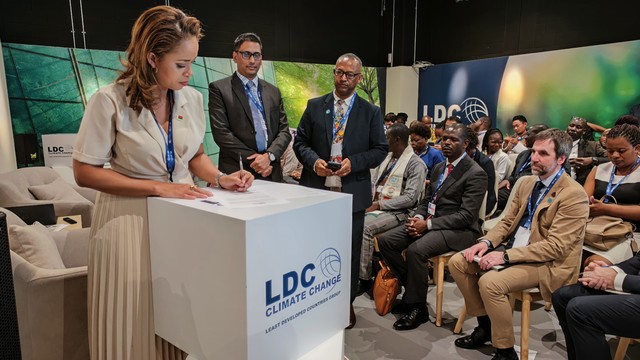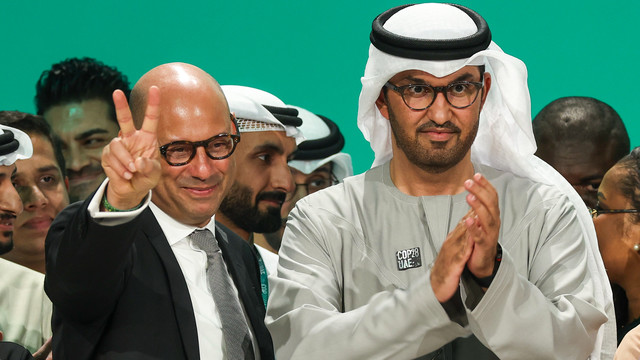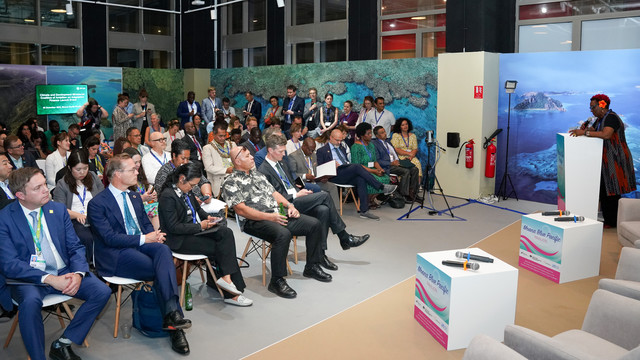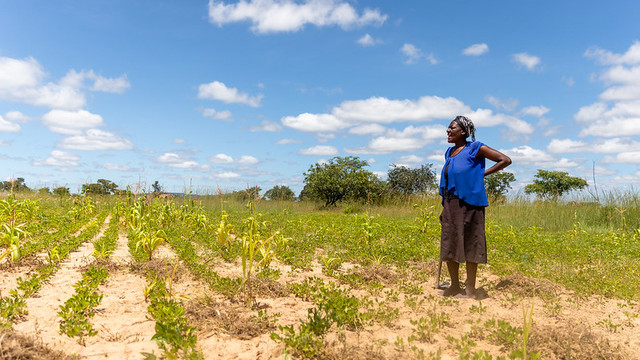Navigating conflict: my difficult journey to become a new climate change negotiator
Despite the ongoing conflict in her home country, Sudanese climate activist Tasneem Sied Ahmed is determined to amplify the voices of those who – like herself – are being affected by loss and damage. With IIED’s support, Tasneem attended the UN climate change negotiations in Bonn in June 2023 and now hopes to see crucial decisions on loss and damage made at the 28th UN climate change conference (COP28) in Dubai in November


Sudanese climate activist Tasneem Sied Ahmed at the UN climate change negotiations in Bonn in June 2023 (Photo: Jérémy Davis, IIED)
I’m committed to contributing to a resilient world where the loss and damage caused by the climate crisis is addressed with urgency and empathy. To become a negotiator for Sudan, I escaped conflict, defied odds and ultimately found my place at the international forum for decision-making of the United Nations Framework Convention on Climate Change (UNFCCC) in Bonn, Germany earlier this year.
My story begins in Sudan, a country that has long struggled with both climate change vulnerabilities and conflict. As a researcher working on the Darfur Land project with local NGO Salamedia, I witnessed first hand the intricate links between land, conflict and the exacerbating effects of climate change.
This experience ignited my passion to advocate for environmental concerns, especially given the lack of awareness among our population and policymakers.
In March, I applied to IIED’s programme to support new climate negotiators from least developed countries (LDCs) who are new to the UN climate change negotiations. Selected negotiators receive logistical support to attend the 2023 UNFCCC sessions, training on negotiations and media engagement, as well as personal mentoring from a senior member of the Least Developed Countries ((LDC) Group. I saw the programme as a beacon of opportunity, giving young climate activists like me the chance to have an impact on climate diplomacy.
On 6 April 2023, I was informed that I had been selected to be part of IIED’s new cohort of LDC negotiators. But just less than two weeks later, war broke out in my home city of Khartoum.
Escaping the war-torn city was not just a physical journey but a soul-testing trial. My family and I fled the conflict zone to a safer town. But I then had to continue my journey to Cairo alone to secure my visa to Germany for the climate negotiations in June. Although the challenges I faced were many, my determination propelled me forward. Arriving in Germany was a dose of hope.
Negotiating loss and damage
The 58th Subsidiary Bodies to the UNFCCC Session (SB58) in Bonn was the second international climate negotiation session I have attended. I was at COP27 in Sharm El-Sheikh in Egypt in 2022, where a historic breakthrough agreement was made to establish a new loss and damage fund for vulnerable countries, in part influenced by the LDC Group’s position on loss and damage.
The LDC Group focuses on the urgent need for enhanced action and assistance for vulnerable developing countries and consistently emphasises the need for financial commitments from developed countries. After my experiences at COP27, I was certain that I too wanted to follow loss and damage negotiations.
In Bonn, a central discussion point was choosing a host institution for the UNFCCC’s Santiago Network on Loss and Damage. The SNLD’s purpose is to catalyse technical assistance of relevant organisations, bodies, networks and experts to help avert, minimise and address loss and damage in vulnerable countries. The outcomes of these SB58 sessions have significantly influenced the roadmap leading to COP28. But unfortunately, parties could not agree on which institution should host the Santiago network.
The loss and damage negotiations were a maze of different perspectives and priorities. I really benefited from the daily follow-ups IIED held with our cohort of new negotiators. Their guidance helped me to understand the process, history and norms of climate negotiations. In addition, the support and solidarity of the small number of Sudanese experts who managed to attend due to the ongoing conflict proved invaluable to me.
This experience taught me the vital importance of coordinated efforts among countries such as the LDC Group to effectively address loss and damage. I learnt that sometimes, discussions may seem minor – but they might contribute to a larger mosaic of international cooperation. It also provided valuable insights into the complexities of international climate diplomacy and how decisions are made in this realm.
Navigating conflict: a hard journey remains
My journey to Bonn was not limited to conference rooms: it was woven into the broader fabric of my life. While there, I spent a lot of time thinking about the difficulties I had faced in reaching Germany and the uncertainty of my situation.
It slowly became clear to me that the conflict in Sudan would not end soon and that I would never go back to my previous life. I was devastated when new visa rules from Egypt restricted my intention to return there. I then tried to go to the United Arab Emirates, but sadly, that visa application was rejected too. I believe border restrictions should be eased in the case of any conflict, not broadened!
As result, I have had to remain in Bonn and now, even months after the SB58 negotiations ended, I am still in Germany. But I wouldn’t have been able to navigate my way through this time without the continuous support of IIED.
Expectations for COP28
With the lessons learnt from SB58 and a strong foundation in understanding the complexities of loss and damage negotiations, my expectations for COP28 are driven by a desire for progress and action. I anticipate continued efforts to select a host for the Santiago Network for Loss and Damage, coupled with an increased focus on implementing solutions and financial support for vulnerable developing countries.
I still do not know if I will be able to attend COP28 in person or if I will have to participate remotely. But I hope that there will be a complete Sudanese delegation attending the event and that I will be able to actively contribute to drafting submissions with my national delegation.
I also aim to continue aligning our work with the LDC Group on negotiating for more support for loss and damage at COP28, and supporting the LDC Group to combat climate change. For me, COP28 presents an opportunity to build on the experiences and knowledge I have gained, fostering more effective and inclusive climate diplomacy.
Despite all the uncertainty I have faced, my journey as a junior negotiator symbolises the power of determination, the strength of youth engagement, and my unyielding hope for a sustainable future.
As I continue to navigate this difficult time, I am committed to contributing to a resilient world where loss and damage are addressed with urgency and empathy. I am determined to amplify the voices of those affected by climate change – especially in LDCs – and to work to engage more youth in the process.
I will continue on my path to become an expert negotiator and to make my voice heard in shaping vital global policies to address climate change.




